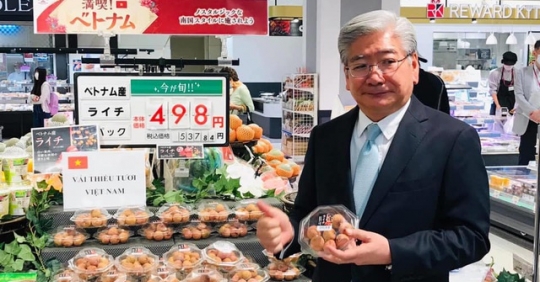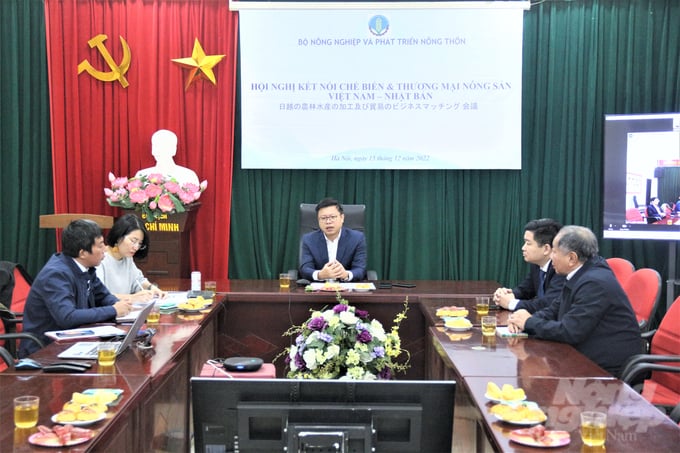
Online conference linking processing and trading of agricultural products of Vietnam and Japan. Photo: Pham Hieu.
Vietnam to be agricultural export market Japan’s fifth largest
According to the Department of Agricultural Product Processing and Market Development (Ministry of Agriculture and Rural Development), travel and logistics bottlenecks in trade between Vietnam and Japan are currently recovering gradually after a long period. The Covid-19 pandemic has hit the world trade supply chain badly .
At the same time, the consumption market and production capacity of the two countries also gradually recovered, the need for enterprises to rebuild supply chains and find new partners became urgent.
In response to this request, the Ministry of Agriculture and Rural Development organized on 15 Japan” with the aim of updating the situation regarding production, processing and trade of agricultural, forest and fishery products between the two countries, while creating opportunities for businesses of the two countries Connect, build partnerships, find new business opportunities.
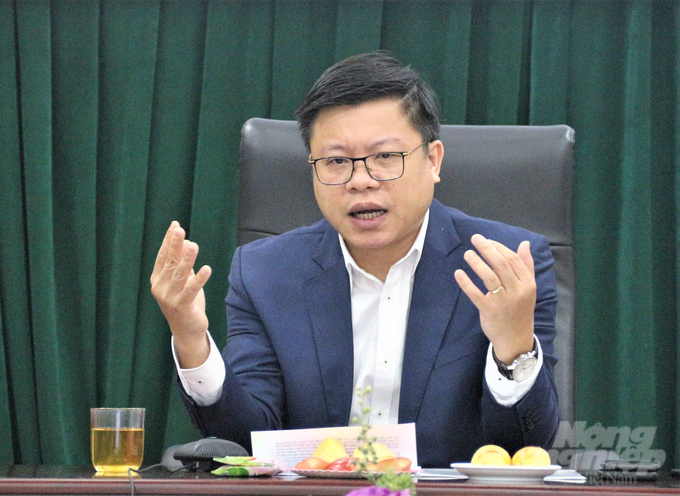
Mr. Nguyen Quoc Toan said that both Japan and Vietnam have become the major import and export markets for agricultural products. Photo: Pham Hieu.
According to Mr. Nguyen Quoc Toan, director of the Department of Agricultural Products Processing and Market Development, both Japan and Vietnam have become the top import and export markets for agricultural products. Japan is currently Vietnam’s third largest agricultural export market (after the US and China).
In reverse, Vietnam has overtaken both Korea and Thailand to become Japan’s fifth largest agricultural export market. This shows the need to strengthen and promote agricultural trade between the two countries.
“Vietnam attaches great importance to Japanese partners and always focuses on product quality, commitment and ecological and social responsibility of agricultural products when exporting to Japan. At the same time, Vietnam and the Ministry of Agriculture and Rural Development are developing concrete plans to build modern, ecological and responsible agriculture,” emphasizes Mr. Nguyen Quoc Toan.
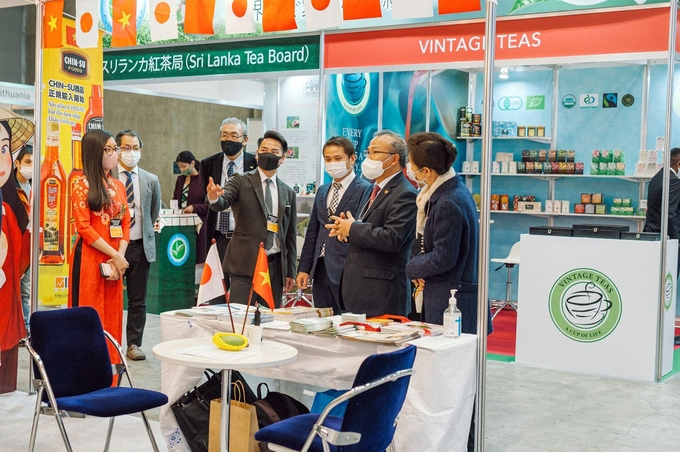
Vietnam has overtaken both Korea and Thailand to become Japan’s fifth largest agricultural export market. Photo: COME CO. LTD.
Director-General Nguyen Quoc Toan said that the conference was attended by 64 Vietnamese companies and 71 Japanese companies, expressing that through the conference, the business communities of the two countries will see true value in trade relations.
Data from the General Department of Customs shows that in 2021 Vietnam will export agricultural products worth more than USD 3.66 billion and import about USD 672 million in trade with Japan. Accordingly, Vietnam has a trade surplus of almost USD 3 billion in agricultural products on the Japanese market.
Conquer consumers in “land of cherry blossoms”.
According to Mr. Ta Duc Minh, Trade Advisor for Vietnam in Japan, Japan has great demand for foreign agricultural and aquatic products, including: fish and processed products of fish, shrimp and eel, meat and meat products, soybeans, cereals, fresh and processed vegetables, coffee, etc. Accordingly, Vietnam is fully able to supply the Japanese market.
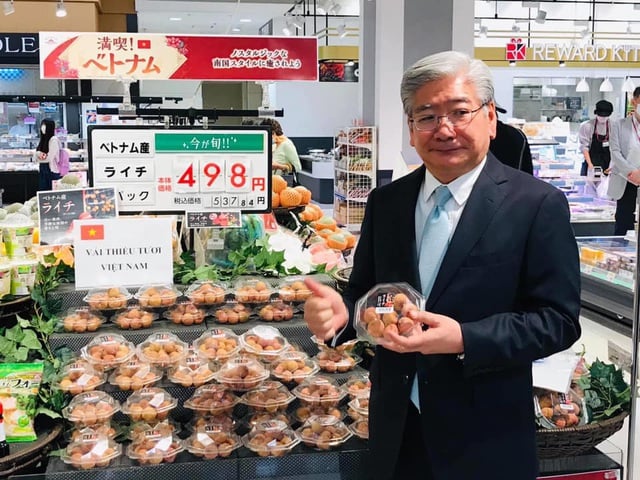
Vietnam is fully capable of supplying the Japanese market. Photo: tsp.
Cumulatively in the first 10 months of 2022, Vietnam’s agricultural and aquatic exports to Japan reached US$1.87 billion, an increase of 27.8%. The top products are aquatic products (US$1.43 billion, up 33%); coffee ($231 million, up 26.3%); Vegetables and Fruits ($141.3 million, up 6%); cashews ($41.1 million, down 15.8%); Pepper (US$16.3 million, up 96%); Rubber (US$15.3 million, down 13.7%)…
Talking about the benefits of exporting Vietnamese agricultural products to Japan, Mr. Ta Duc Minh said that there are currently about 500,000 Vietnamese living in Japan. Vietnamese foods are becoming increasingly popular in the Japanese market.
Besides, preferential tariff reduction in free trade agreements the two countries are party to, including VJEPA, AJCEP, CPTPP, RCEP, is also an advantage for Vietnam to export agricultural products to Japan.
Notably, in the CPTPP agreement, Japan eliminated tariffs on the vast majority of Vietnam’s agricultural and aquatic products, a higher level of commitment than the VJEPA and AJCEP agreements. In the RCEP agreement, Japan eliminated tariffs on many groups of agricultural products, meat, vegetables and seafood … of ASEAN, including Vietnam.
“In addition, the recent depreciation of the yen against the dollar has put pressure on Japanese consumers to spend. If Vietnamese goods are of the same quality and lower prices, they have an opportunity to substitute goods from other countries or partially domestic goods,” Mr Ta Duc Minh said.
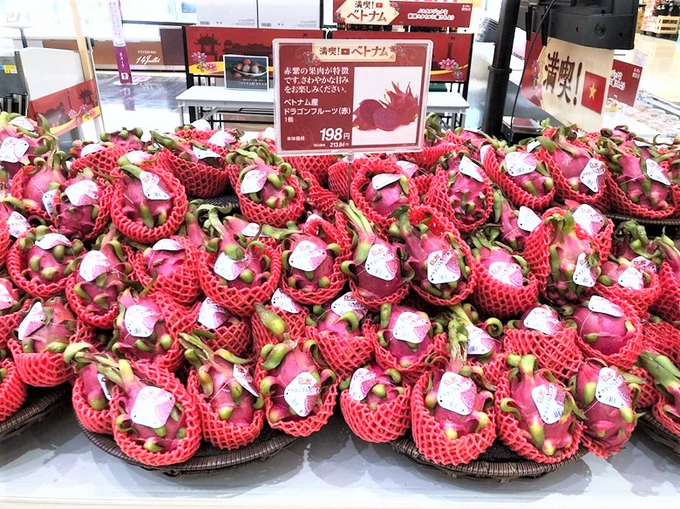
Vietnamese foods are becoming increasingly popular in the Japanese market. Photo: tsp.
However, the Vietnamese trade adviser in Japan also pointed to the difficulties in exporting agricultural products to Japan. Accordingly, Japan has a complex distribution system with many middle classes. Difficult to sell directly to supermarket chains, retail outlets and consumers, Vietnamese goods must pass through major import centers.
“In particular, Japan has strict regulations on imported agricultural, aquatic products and food with high standards in terms of growing conditions, livestock husbandry, handling, packaging, labeling and handling, pest and disease management, animal and plant quarantine…
For companies that cause food safety violations, the scope and frequency of inspections by Japanese customs will increase, which will increase the time and cost of customs clearance, sometimes resulting in the loss of customs customers and sales markets, as well as affecting export business in general.” said Mr Ta Duc Minh.
In addition, Mr. Minh also noticed more Japanese consumption habits and tastes. When it comes to imported food, the Japanese not only pay attention to quality, hygiene and safety, but also to product form such as size, color, design and preparation method Changes in raw material prices.
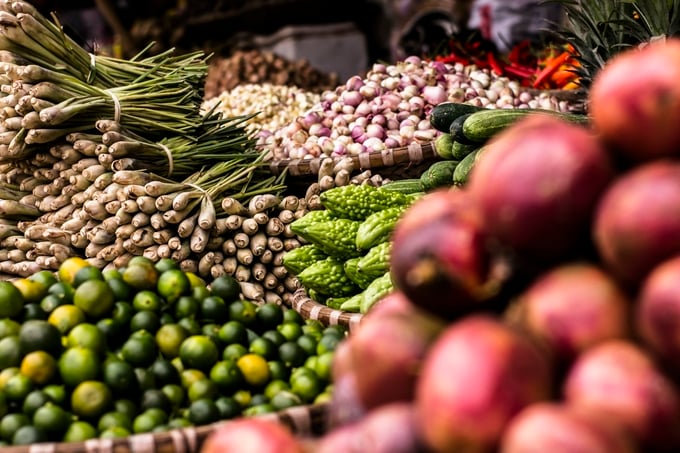
Japan has strict regulations on imported agricultural and aquatic products with many high standards. Photo: tsp.
Since then, the Vietnamese trade adviser in Japan has taken notes when Vietnamese companies export agricultural products to Japan. Accordingly, companies must use the tariff preferences of free trade agreements (VJEPA, AJCEP, CPTPP, RCEP…) effectively. At the same time, it is necessary to ensure price stability and supply from Vietnam.
“Products must always ensure good quality to meet Japan’s strict food hygiene and safety regulations, and at the same time, there must be a variety of flavors to suit the Japanese. in packaging design to catch the eye and attract consumers,” Mr. Ta Duc Minh informed.
At the same time, more attention should also be paid to the propaganda and introduction of brands and products in many forms. The Vietnam Trade Office in Japan will always play the role of supporting and guiding businesses, with the common goal of helping Vietnamese brands become more popular in Japan and around the world.
At the conference, the Japanese side expressed interest in focusing on the field of agricultural product processing, such as post-harvest losses, food hygiene and safety, cold storage chain in the whole two-way supply chain, export and import…
The product groups that Japanese companies are interested in are processed seafood, coffee, cocoa, fresh and frozen vegetables, natural honey…

